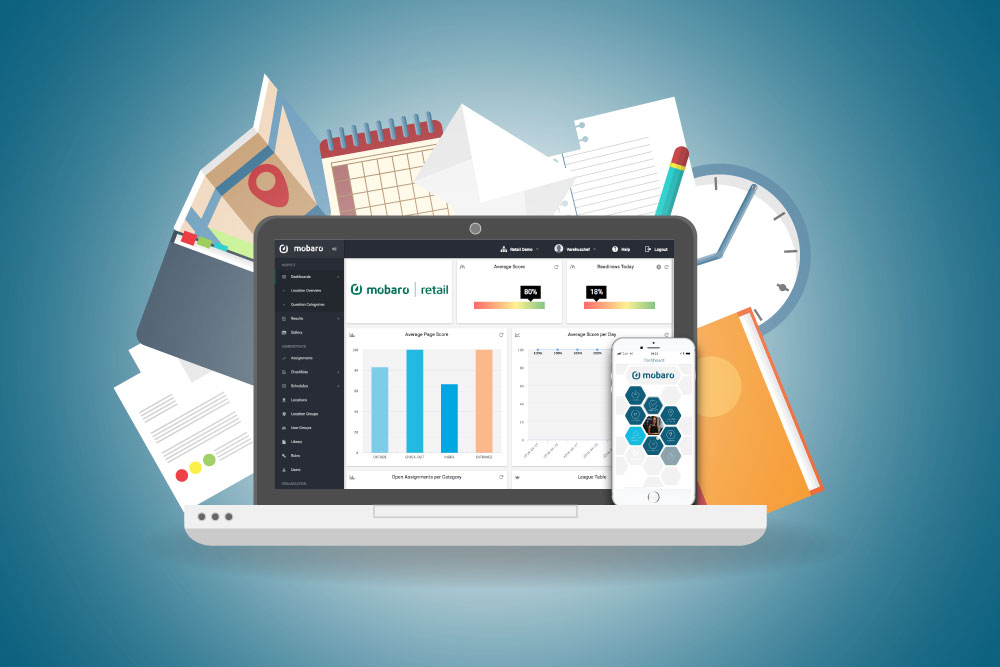When forecasting the benefits for some of the biggest British retailers, the results speak for themselves. There are great financial gains in upgrading the means with which you run compliance checks across a large number of units. Already, Pizza Hut Restaurants are living proof that digitizing area management checks comes with massive savings. On top of that, the advantages of benchmarking insights open enumerable doors to nurturing a healthy and peak-performing business.
From Land’s End to John O’Groats, the UK’s roads are swarming with Area Managers, making store visits to ensure their managers are supported in delivering best practice, improving staff competence, confirming legal and statutory obligations are met, all ultimately to achieve a consistent, on-brand, customer experience.
What if you could change just 1 thing and achieve 3-4 times ROI?
Ironically, while the Area teams are focused on ensuring stores are of a high standard and that best practice is in place, their own means of doing so are in need of an upgrade! In the world of mobile apps and real-time data on the cloud, there is a mismatch with how retailers engage tech to deliver a customer experience and don’t apply same thinking to the colleague experience… In fact, the preferred tools for in-field teams to capture and share action plans include pen and paper, phone calls, emails, texts, WhatsApp and good old memory, which isn’t what we recall it once was.
Mobaro have been having conversations with many of the UKs most well-known high street brands, and a common theme emerged: they all agreed that the amount of time spent at a store visit, making notes, writing it up, sharing it and following through is immense. Generally speaking retailers are telling us that they currently complete these essential store support visits / best practice “audits” as follows (does this sound familiar?):
- Drive to the store, spend around ½ a day with the manager and other staff / floor walks / checking that statutory compliance has been met
- Back at the office, spend around ½ a day writing up the visit, following up on actions, communicating/delegating any actions required (e.g. any facilities maintenance), share write up with store manager and pass information on to a central operations support function or similar
- Central operations then spend up to ½ a day to review most recent findings vs last visit and to apply some form of scoring – the insight shows if the store has improved / acted on the last visit outcomes or not, the scores are input into a database that includes results from all stores that is then made available to relevant teams allowing some form of benchmarking to take place
- Once the “progress vs last visit” information is available (approx. 3 weeks later) the area manager will again drive to the store, spending another ½ day to review the findings and agree next steps as part of the manager’s action plan
So, that is a total of 2 days effort PER store, and, in general, this is repeated quarterly! So, 8 days of effort per store per year…
On the other hand, if the same business were to use Mobaro to digitise the area manager visit then that would drop to:
4 days per store annually, which equates to almost 2 full time area managers who's time would suddenly be freed up. Furthermore, it would eliminate the 3-week delay from visit to results, and it would automate follow-up on actions.
So as you can see, from just this 1 process, the ROI is compelling!
Automatic follow-up
In the existing process there is also the issue of ensuring important actions are being followed up on – area managers can waste a huge amount of time chasing up internal and external teams to ensure that their stores are getting the support they need… no doubt many hours have been lost trying to find out if the plumber has, or has not, yet resolved the leaking staff loo!! By digitising the process, Mobaro enables you to have complete transparency of what actions have / have not been picked up, and, when to expect a resolution. The data allows you to understand how quickly issues are addressed, meaning you can monitor response times and service levels, and it can also be analysed to better understand where the bottlenecks are in the operations, therefore, how to eliminate issues going forward.
Faster insights with learning opportunities
One of the most important aspects to be aware of when making the move to digital is the advanced means of scoring specific topics and comparing / aggregating key figures. Mobaro comes with a number of reporting solutions that means you get real-time, actionable insight on your most important KPIs.
When Pizza Hut Restaurants joined the Mobaro platform, they relaunched what was already an extensive programme for assessing key aspects of their business and brand concept.
Combining their BI efforts with the digital tools means that area management now has a much better foundation for guiding each restaurant.


